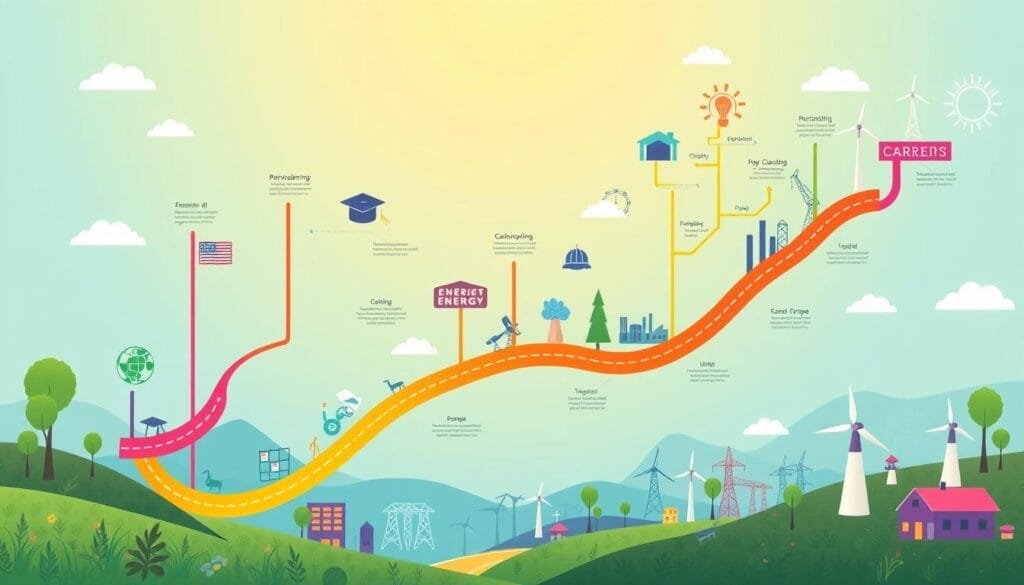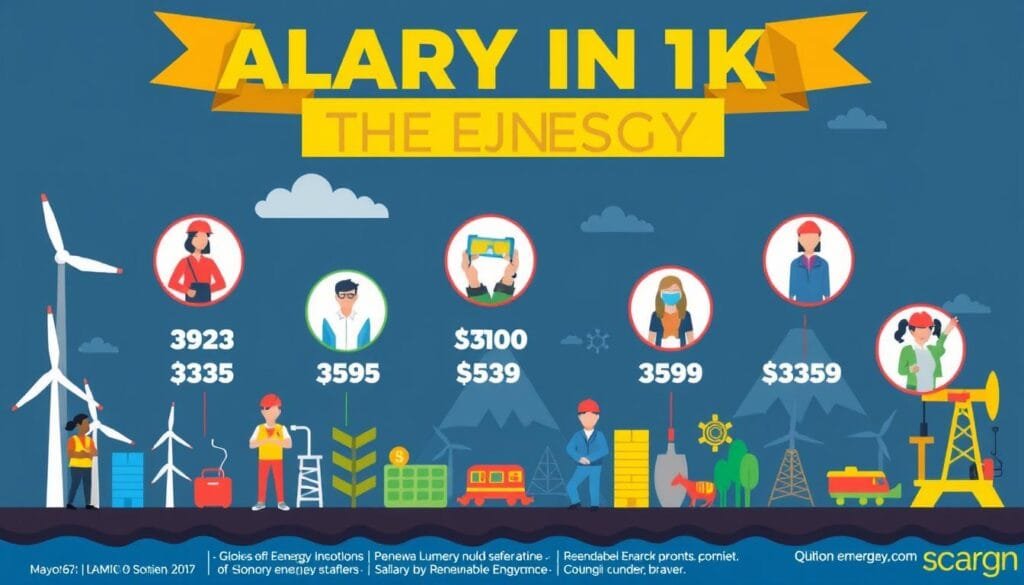The U.S. energy sector now employs 8.35 million people. Clean energy jobs grew by 4.9% in 2023. This is more than double the overall U.S. job market growth. This shows a lot of energy job opportunities for those looking for new careers.
The energy industry is changing fast. Now, renewable energy jobs make up over 40% of all energy jobs. Knowing how many jobs are available in energy is key for job seekers and professionals.
Our career guide looks at the exciting energy career options. It covers many areas, like solar, wind, and electric vehicle infrastructure. The energy job market has many diverse and interesting paths for ambitious people.
Key Takeaways
- Clean energy jobs grew 4.9% in 2023, outpacing overall economic job growth
- Renewable energy now accounts for over 40% of energy industry jobs
- 250,000 new jobs were created in the energy sector in 2023
- More than 6 out of every 100 jobs are now in clean energy
- Diverse career opportunities exist across multiple energy subsectors
Overview of the Energy Sector Employment Landscape
The energy industry is changing fast in 2024, opening up new chances for jobs. Over 8.1 million Americans work in this field, showing it’s growing and changing.
Current Employment Statistics in Energy Industry
Recent numbers give us a clear picture of the energy sector’s workforce:
- Total employment grew by 4 percent from 2021 to 2022
- Clean energy jobs increased 3.9 percent nationally
- Job growth varied across different technology categories
Growth Trends and Market Dynamics
The energy job market is strong and full of new ideas. Some areas are growing really fast:
- Motor vehicles: +13 percent
- Fuels: +11 percent
- Energy efficiency: +7.4 percent
- Electric power generation: +6.1 percent
Impact of Government Policies on Job Creation
“The energy sector is experiencing unprecedented transformation, driven by strategic government investments and technological advancements.” – Energy Workforce Analyst
Government actions like the Bipartisan Infrastructure Law are helping create more jobs in energy. Strategic policy interventions continue to shape the employment landscape, pushing for new ideas and sustainable growth in energy tech.
There’s a big move towards clean energy jobs, with renewables leading the way. As the industry keeps changing, workers will find more varied and tech-savvy jobs.
How Many Jobs Are Available in Energy: Latest Statistics
The energy job market is booming, with a record number of jobs worldwide. In 2023, the energy sector added 2.5 million jobs globally. This growth pushed the total number of jobs to over 67 million, a 3.8% increase.
Looking at the different areas within energy, we see some exciting trends:
- Clean energy sector contributed 1.5 million jobs in 2023
- Solar PV industry added over 500,000 new jobs
- Electric vehicle manufacturing created 410,000 jobs
- Oil and gas supply sector expanded by 600,000 positions
In the United States, the energy job scene is even more vibrant. There were about 923,400 clean energy jobs in 2021. Experts predict even more growth in the future.
| Energy Subsector | Job Growth Projection |
|---|---|
| Wind Turbine Technician | 44% by 2031 |
| Solar PV Installer | 27% by 2031 |
| Sustainability Specialist | 7% by 2031 |
“The energy job market is not just growing; it’s transforming the global workforce landscape.” – Energy Employment Report 2023
Looking at where these jobs are, Asia is a big player, with most renewable energy jobs. The Inflation Reduction Act has also boosted jobs in the U.S. clean energy sector. It created over 100,000 new jobs in just six months.
Clean Energy Jobs Growth and Market Evolution
The renewable energy sector is booming, changing the job scene in the United States. Green energy jobs are key to economic growth, creating many job opportunities for skilled workers.
Recent data shows a big jump in renewable energy jobs. About 3.5 million Americans now work in clean energy, with the sector growing faster than the overall U.S. job market in 2023.
Renewable Energy Employment Opportunities
The renewable energy job market offers many career paths in different technologies:
- Solar photovoltaic technologies: 4.9 million global jobs
- Hydropower: 2.5 million direct employment positions
- Wind power: 1.4 million jobs worldwide
- Biofuels: 2.5 million jobs in agricultural supply chains
Comparison with Traditional Energy Sectors
Renewable energy now employs three times more workers than traditional energy. The global market for renewable energy innovations is expected to hit $23 trillion by 2030, showing huge growth possibilities.
| Energy Sector | Total Jobs | Growth Rate |
|---|---|---|
| Renewable Energy | 3.5 million | 4.9% |
| Traditional Energy | 1.2 million | 1.2% |
Regional Distribution of Energy Jobs
Clean energy jobs are not spread evenly. Asia has nearly two-thirds of global renewable energy jobs, but the United States is also a big player, mainly in solar and wind power.
“The future of energy is green, and the job market reflects this transformative shift.” – U.S. Department of Energy
Solar and Wind Energy Career Opportunities
The renewable energy jobs market is growing fast. It offers great career chances for those who want to work in green energy. Solar and wind energy are key areas for sustainable jobs in the U.S.

In 2023, solar jobs jumped up by 279,447, with a 5.9% increase from the year before. Wind energy also has exciting career paths, with many roles available in different states.
“Renewable energy is not just an environmental solution, but a robust economic opportunity for workforce development.” – Clean Energy Expert
Key Career Opportunities in Solar and Wind Energy
- Solar Panel Installation Specialist
- Wind Turbine Technician
- Solar System Design Engineer
- Renewable Energy Project Manager
- Energy Storage Systems Technician
State-Level Job Distribution
| State | Clean Energy Jobs | Notable Sectors |
|---|---|---|
| California | 145,000 | Solar, Wind |
| Texas | 53,000 | Multi-source Energy |
| Nevada | 9,000 | Solar Specialization |
| Massachusetts | Ranking 2nd | Solar Jobs |
Those starting in solar and wind energy can look forward to good pay. Wind turbine technicians make nearly $57,000 a year, and solar installers earn over $45,000.
The shift to clean energy means lots of new jobs. By 2030, about 13.3 million jobs could be added. This is a big chance for people to find fulfilling careers in renewable energy.
Energy Storage and Smart Grid Employment Prospects
The energy sector is going through big changes. New technologies like energy storage and smart grids are opening up many job opportunities. As we move towards more green infrastructure, workers in the energy field are leading the way in innovation.
The Department of Energy’s Grid 2030 Vision is a big step towards updating our electric system. With $16 billion set aside for grid upgrades, the energy sector is expected to grow a lot.
Battery Technology Positions
Battery technology is a key area in the energy job market. It’s seeing huge changes thanks to new tech and market trends.
- Research and Development Roles
- Battery Production Engineering
- Quality Control Specialists
- Battery Systems Design Engineers
Grid Modernization Roles
Grid modernization is opening up new career paths. It’s expected to create about 280,000 jobs in the next few years.
| Job Category | Projected Growth |
|---|---|
| Smart Grid Technicians | 15-20% |
| Grid Infrastructure Engineers | 12-18% |
| Renewable Energy Grid Integration Specialists | 20-25% |
EV Infrastructure Jobs
Jobs in electric vehicle infrastructure are growing fast. There are many roles in installing, maintaining, and developing EV charging systems.
“The transition to smart grids and electric vehicles is not just a technological shift, but a complete employment ecosystem.” – Energy Workforce Expert
Community colleges are key in training for these jobs. They’ve received $40 million in federal funds for smart grid programs. Almost all graduates from alternative energy programs get jobs in energy efficiency and related fields.
Energy Efficiency and Building Technologies Careers
The energy efficiency sector is booming, with nearly 2.3 million Americans working in it. It’s a key part of the green energy job market.
People in this field help make buildings more sustainable and efficient. In 2023, the sector added 75,000 jobs, the biggest jump in five years.
“Energy efficiency is not just about saving power, it’s about creating innovative career opportunities that drive sustainable development.” – Energy Workforce Expert
Some top jobs in energy efficiency include:
- HVAC Specialists
- Energy Auditors
- Building Performance Analysts
- Weatherization Experts
- Green Building Designers
Jobs in this field pay well. For example, HVAC mechanics and installers earned a median of $57,300 in 2023. There are many ways to grow your career and learn new skills.
Energy jobs are found all over the country. California has the most, with 302,176 jobs. Texas and New York also have a lot. The sector is expected to grow by 5.3% in 2023.
9% of energy jobs go to veterans. The industry is in 88% of U.S. counties, showing its wide reach and economic value.
Demographics and Diversity in Energy Workforce
The energy industry is changing fast, with more diversity in the workforce. Knowing who works in energy is key to making it more inclusive.
Veteran Employment in Energy
Veterans are a big part of the energy job market. They make up 9% of the energy workforce, more than their 5% share in the U.S. workforce. This shows the energy sector’s support for veterans starting new careers.
Age Distribution Insights
The energy workforce is young and dynamic. About 29% of workers are under 30. This shows the industry is appealing to young people looking for new and green careers.
Diversity and Inclusion Initiatives
Even with progress, the energy sector faces diversity challenges. Key efforts include:
- Opening more jobs for underrepresented groups
- Working with Historically Black Colleges and Universities (HBCUs)
- Creating welcoming hiring practices
- Starting mentorship programs
“Diversity is not just a metric to be measured, but a fundamental strategy for innovation and growth in the energy industry.” – Energy Workforce Expert
| Demographic Category | Representation Percentage |
|---|---|
| Veterans | 9% |
| Workers Under 30 | 29% |
| Minority Representation | Varies by Sector |
The energy sector is growing, seeing diversity as key to innovation and community reflection. It keeps working to offer fair jobs to everyone in the industry.
Educational Requirements for Energy Careers

Getting into the energy industry needs careful planning. The job market has changed a lot. Now, there are more programs for renewable and traditional energy jobs.
Here are the main ways to get into energy jobs:
- Associate’s and Bachelor’s Degrees: Most jobs need at least two or four years of college in related fields.
- Engineering concentrations: Electrical, mechanical, and chemical engineering.
- Specialized renewable energy programs at places like Georgia Tech and Purdue University.
“Education is the cornerstone of successful energy career prospects” – Energy Workforce Development Expert
Universities are creating new courses for the energy field. They offer programs in:
- Solar energy technologies
- Wind turbine engineering
- Sustainable infrastructure design
- Energy efficiency management
Getting certifications and continuing education is key. Groups like the American Solar Energy Society offer training through workshops and conferences.
To succeed, you need to learn about different areas. Mix technical skills with business and environmental knowledge. This will open up many career paths in this changing field.
Key Skills and Certifications in Energy Industry
To succeed in the energy job market, you need to focus on key skills and certifications. The energy sector is always changing. It looks for people who are both tech-savvy and adaptable.
Looking for a good job in energy? You must have both technical and soft skills. These skills should match what the industry needs.
Technical Competencies
Technical skills are very important in the energy field. Here are some key ones:
- Software proficiency (CAD, PVsyst, Helioscope)
- Electrical engineering expertise
- Data analysis capabilities
- SCADA and PLC systems knowledge
Professional Certifications
Certifications can really help your career in energy:
| Certification | Focus Area | Key Requirements |
|---|---|---|
| Certified Energy Management (CEM®) | Energy Engineering | Bachelor’s degree, professional experience |
| Project Management Professional (PMP®) | Project Management | 35 hours project management education |
| Certified Energy Auditor (CEA®) | Energy Efficiency | Comprehensive energy assessment skills |
Soft Skills Requirements
The energy sector also values soft skills:
- Communication skills
- Problem-solving abilities
- Adaptability
- Collaborative mindset
- Strategic thinking
“Success in the energy industry is no longer about technical skills alone, but about creating holistic solutions that integrate technology, business, and environmental considerations.” – Energy Industry Expert
Continuous learning and professional development are key to staying ahead in the energy job market.
Salary Ranges and Benefits in Energy Sector

The energy industry is booming, with great pay and benefits. Jobs in this field pay more than the national average. Workers get good money and benefits, making these jobs very appealing.
Here are some key salary insights for jobs in the energy industry:
- Energy workers earn 34% more than the median U.S. wage
- Average national wage for energy jobs ranges well above $19 per hour
- Specific subsectors offer unique compensation packages
Different energy sectors have different pay levels:
| Energy Sector | Wage Competitiveness |
|---|---|
| Nuclear Energy Generation | Highest paying area |
| Solar Electricity | Competitive with fossil fuel wages |
| Wind Energy | Comparable to fossil fuel wages |
“The energy sector continues to offer promising financial opportunities for skilled professionals.”
New clean energy technologies are creating more jobs and better pay. As demand for green energy grows, salaries and benefits will keep getting better. This is great news for those looking into energy careers.
Future Job Growth Projections in Energy
The energy job market is changing fast, thanks to new tech and policy changes. Clean energy jobs are leading the way in economic growth. They’re creating new chances in many fields.
The world of energy is changing quickly, opening up new chances for those in green energy. Recent numbers show the energy sector is moving fast:
- Clean energy added 4.7 million jobs globally from 2019
- Now, clean energy jobs make up more than half of new jobs in the energy sector
- The Inflation Reduction Act could create over 300,000 jobs every year
Emerging Technologies Impact
New tech is changing the energy job scene. Key areas creating jobs include:
- Solar PV installations
- Electric vehicle manufacturing
- Battery technology development
- Smart grid infrastructure
The clean energy shift is not just for the planet but also a huge economic chance.
Policy Influence on Job Creation
Government policies are key in changing the energy job market. The Inflation Reduction Act is a big help, boosting jobs and investments in many states.
| State | Projected Jobs | Investment |
|---|---|---|
| Texas | 100,000+ | $15 billion |
| Florida | 80,000+ | $10 billion |
| California | 40,000 | $6 billion |
The outlook for energy jobs is good, with clean tech jobs paying well and promising careers for many.
Career Advancement Opportunities
The energy industry is full of chances for growth and innovation. There are many energy job opportunities across different sectors. This offers a wide range of paths for career development.
To move up in the energy industry, professionals can take several steps:
- Pursue specialized technical certifications
- Develop interdisciplinary skills
- Seek mentorship from experienced industry leaders
- Participate in cross-functional training programs
Advancing in the energy sector often means moving between different areas. Being adaptable and always learning is essential to stay ahead.
“The most successful energy professionals are those who view their careers as a journey of constant growth and innovation.” – Energy Workforce Association
Some key opportunities for advancement include:
| Career Path | Typical Progression | Growth Potencial |
|---|---|---|
| Technical Roles | Technician → Senior Specialist → Technical Manager | Up to 68% employment growth |
| Engineering | Entry-level Engineer → Project Lead → Chief Engineering Officer | 8-22% job market expansion |
| Renewable Energy | Solar Installer → Project Manager → Renewable Energy Director | 52% projected job increase |
To make the most of energy career opportunities, stay updated on new technologies. Keep your technical skills sharp and build strong networks.
Government Initiatives and Energy Employment
The U.S. government is key in changing the energy job market. It has launched big plans and put in a lot of money. Laws like the Infrastructure Investment and Jobs Act and the Inflation Reduction Act have spent almost $956 billion on energy over ten years.
Government programs are changing the energy sector by creating jobs and helping workers grow. The Department of Energy (DOE) has started new programs. These include fellowships and internships to give people hands-on experience in utilities and energy cooperatives.
- Clean Energy Innovator Fellowship offers two-year decarbonization project opportunities
- Workforce training programs targeting transitioning energy workers
- Competitive funding for revitalizing energy communities
Recent numbers show the government’s focus on clean energy jobs. In 2023, the energy sector added over 250,000 jobs. Clean energy made up 56% of these jobs. Heat pump jobs, in particular, grew a lot, adding 74,700 jobs.
The future of the energy sector workforce depends on strategic government intervention and forward-thinking policies.
Government policies are expected to create many jobs. The Inflation Reduction Act and Bipartisan Infrastructure Law could add 900,000 jobs by 2035. More jobs could come from plans to reach net-zero emissions.
| Policy Initiative | Projected Job Creation by 2035 |
|---|---|
| Net-Zero Emissions Scenario | 6.5 million net jobs |
| Advanced Tax Credit Scenario | 5.1 million net jobs |
As the energy sector grows, government efforts will be vital. They will help workers move to new roles, improve skills, and find jobs in new technologies.
Conclusion
The energy sector is booming with career opportunities. From 2021 to 2022, the U.S. saw a 3.8% increase in energy jobs. This added nearly 300,000 jobs, bringing the total to over 8.1 million.
Clean energy jobs are a big part of this growth, making up 3.1 million positions. This is about 40% of all energy jobs.
Looking into the energy job market shows a field that’s always changing. New technologies like electric cars and wind farms are creating jobs. The industry is also diverse, with women making up over half of new hires in 2022.
Veterans also play a big role, making up 9% of the workforce. This is almost double the national average.
Energy careers are growing in many areas, from green tech to traditional fuels. Employers expect job growth from 1.6% in fuels to 6.4% in energy efficiency. This shift towards sustainable energy opens up new chances for those looking for impactful careers.
As the U.S. works towards net zero emissions, the energy sector is full of opportunities. It’s a field where you can use your skills to help fight climate change. It’s a rewarding and exciting career path for those interested in technology and sustainability.

